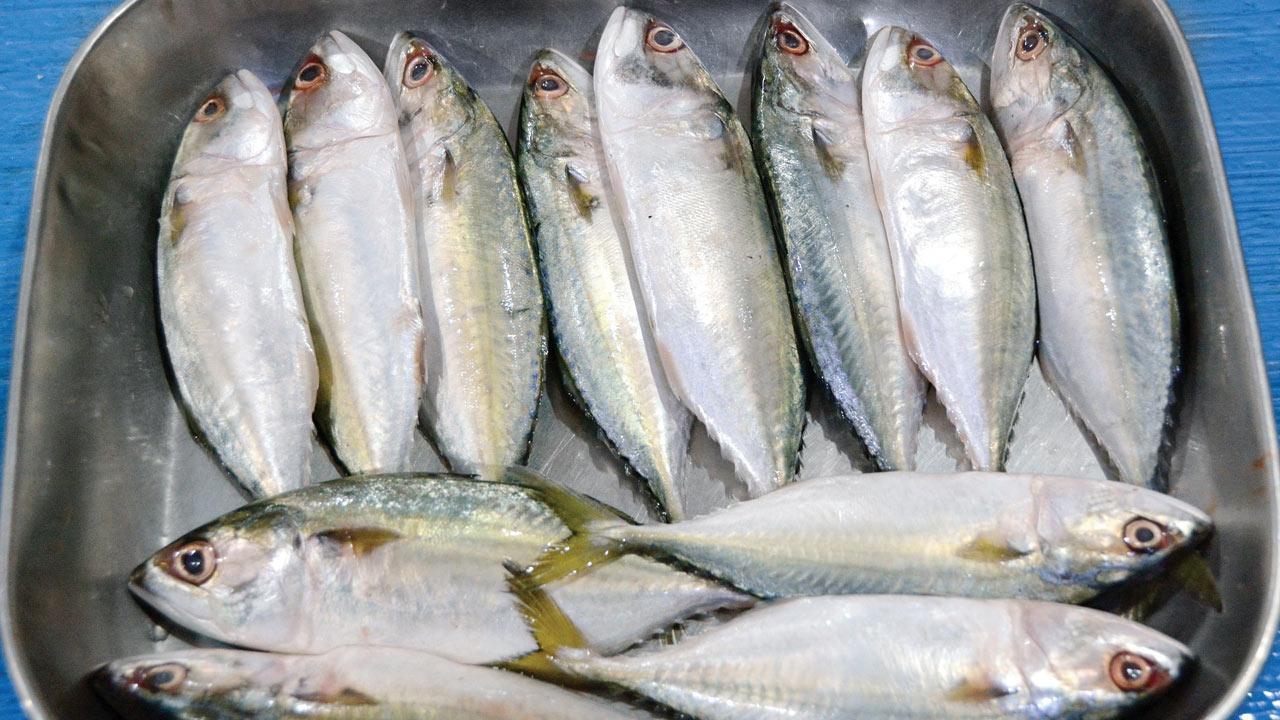With the Indian mackerel now in season, here’s a deep-dive into why the fish reigns supreme, especially post the pandemic. Plus, tips on how to pick the best, and a recipe to savour it

Bangda at Eat Well Cold Storage is sourced from Malvan
Although pomfret, salmon, kingfish (surmai) and Bombay duck (bombil) are the showstoppers in most city fish markets with their fancy prices, it’s the bangda which bags the aam admi’s attention all-year round, especially between October and January. Koli chef Harsha Tapke - who’s been dealing in fresh catch for over three decades - says, “Har koi khaa sakta hai [anyone can purchase and eat]”, as it’s affordable. “It doesn’t matter if you’re rich or poor; bangda provides nutrition and taste to all. It used to sell for only Rs 25, around 25 to 30 years ago. Even now, you get five to six pieces for Rs 200,” she adds. With Indian mackerel being in season this time of the year, fisherfolk, restaurateurs and seafood experts decode why Mumbaikars can’t get enough of it.
ADVERTISEMENT
Fresh Catch’s Bangda jeera meera, rava fry and huggay. Pics/Sayyed Sameer Abedi
Easy availability
Devleena Bhattacharjee, CEO, Numer8, which provides sustainable fishing solutions to fisherfolk, tells us mackerel is a surface-level fish, and is commonly available in the west coast area from Ratnagiri to Cape Comorin. She adds that while bangda is available from October to even March in some parts, the best quality is found up till January.
Ankita and Adith Fernandes
Parag Phadnis, owner, Eat Well Cold Storage in Mulund West, which also delivers to Thane and Bhandup, tells us, “Mumbai gets most of its bangda from Malvan and Goa; it’s found off the city coast too, but the best quality comes from these two regions, as the coast is cleaner.” The vendor, who’s been selling fish for over 20 years and shuttles between Mulund and Crawford Market every day for fresh catch, informs us that Goan bangdas are smaller in size, and tastier than Malvani ones.
Healthy and pocket-friendly
Bhattacharjee notes that the Indian mackerel is easy to catch and one doesn’t need heavy-duty fishing gear. “It’s found near the shore, so even small motorised boats can get this catch within an hour of fishing. It’s a production-friendly fish,” she shares, adding this makes it affordable. A kilogram of bangda costs about Rs 400 in retail markets, Phadnis asserts.
Devleena Bhattacharjee
Another factor contributing to its popularity is the health benefit. “Indian mackerel is rich in Omega3 and selenium, which are good for the heart, cholesterol and overall vitality,” claims Ankita Fernandes, co-owner, Fresh Catch in Mahim. The restaurateur’s brother, Adith, adds that there’s been a spike in demand since COVID-19. “People are more conscious about their immunity now,” he points out.
Kitchen king
Ankita notes that bangda is also fairly easy to clean, and there’s only one bone. “It doesn’t go well with mild curries. Due to the strong oils, it can let off a strong stench if salt and turmeric aren’t added before cooking.”
From fries to gravies, the fish can be cooked in diverse ways. Fresh Catch, for instance, is famous for its huggay, an elaborate preparation of mackerels stuffed with a spicy recheado masala, steamed in banana leaf - a recipe passed down from their grandmother, from Karwar, shares Adith. Meanwhile, Tapke and her son, Tanay, who founded Bombay State Fisheries, add that bangda occupies an important place in the Koli cuisine, too. “It’s generally preferred fried, along with rice or bhakri. We consume it for the oil, in the same way that we eat dry fruits around this time,” Tapke explains.
Bangda coconut curry in Malvan style
Ingredients
>> 1 onion £ 3 to 4 green chillies
>> 1 mackerel
>> 250 gm fresh coconut >> 3 to 4 red chillies >> 1 tbsp cumin seeds >> 1 tbsp coriander seeds >> 1-inch ginger >> 3 to 4 garlic cloves >> 1 tbsp turmeric >> 1 tbsp Koli masala or red chilli powder >> 3 to 4 kokum pieces >> 200 ml water >> Few curry leaves >> 1 cup coriander leaves
Method
Cut and clean a fresh bangda. Blend together red chillies, coriander, garlic, green chillies, ginger, coconut, cumin and coriander seeds into a paste. Pour oil in a pan, and drop a few curry leaves and chopped onions. Add the masala paste, once the onions turn brown. Mix well. Add salt as per taste; put turmeric and red chilli powder. Tip in water, kokum, the bangda pieces and cook for 10 to 15 minutes. Garnish with dhania and serve with bhakri.
- Chef Harsha Tapke
Parag Phadnis
Tips for the best catch
>> It should be shiny; stale ones lack shine. It shouldn’t have a red eye, advises Phadnis.
>> The stomach should be firm.
>> It shouldn’t have scales.
 Subscribe today by clicking the link and stay updated with the latest news!" Click here!
Subscribe today by clicking the link and stay updated with the latest news!" Click here!






